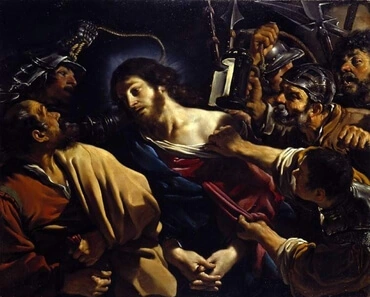Explanation of John 1:10
Durch Brian David

The beginning of John 1 illustrated how divine truth – which is the ultimate expression of the Lord’s love – is the actual creative force of the universe and of reality itself. That idea is reinforced here: "him" refers to Jesus, who was the physical embodiment of divine truth, which indeed made the world.
This verse offers another level, though. "World" represents the church, which is defined in the Writings as "where the Lord is known and where the Word is." By that definition a "church" can be as small as one person, or as large as billions of people worshiping through a wide variety of denominations. And the Writings tell us that the Lord has made sure that such a church always existed, from prehistoric times when the Lord offered "the Word" – His truth – to people directly up through today, when we have the Word in the form of the Bible.
But the world did not know him. At the time the Lord came among us as Jesus, people had turned away from the deeper meanings of the Word (which they then had in the form of the Old Testament), and had little to no concern for knowing the Lord. His church – the church among the Children of Israel – had turned away.
This might seem like a merely historic idea, something that happened then but has little to do with us now. But each one of us is a "church," and each one of us can know the Lord and the Word, or turn away. We all go through states when we are like the church at the time the Lord was born, and He can rebuild us now even as He rebuilt the church then. For that to happen, though, we need to turn to the Word – the Bible – and know the Lord.
(Verweise: Apocalypse Explained 1093; Canons of the New Church 9; The Apocalypse Explained 294 [16])
Arcana Coelestia #1200
1200. That 'Canaan' means external worship that has nothing internal within it has been shown already where Canaan was the subject. The type of external worship which is called 'Canaan' is similar to that of the Jews before the Lord's Coming, and after it as well. They had an external worship, which they also celebrated meticulously, yet they were unaware of what is internal, indeed so unaware of it as to imagine that they lived solely with a body. Of the soul, or faith, or the Lord, or spiritual and celestial life, or life after death, they were totally ignorant. Consequently very many in the Lord's time said that there was no resurrection, as is clear in Matthew 22:23-33; Mark 12:18-27; Luke 20:27-40. When a person is such that he does not believe he will live after death, he also does not believe in the existence of anything internal which is spiritual and celestial. This applies also to people whose lives are sunk in wholly evil desires because they lead merely bodily and worldly lives, especially those who are steeped in filthy avarice. They nevertheless have worship, some going to synagogue, or to church, and taking part in the services, some most meticulously. But because they do not believe in a life after death their worship is inevitably external worship having nothing internal within it, like a shell without a nut, and like a tree on which there is no fruit or even leaves. Such external worship is meant by 'Canaan'. All other types of external worship dealt with above were forms of worship that had internal things within them.






